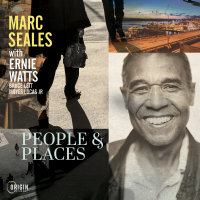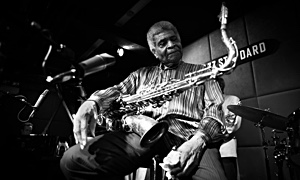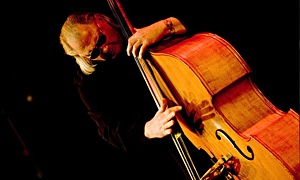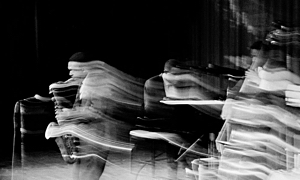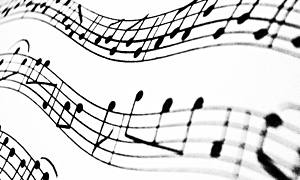Home » Jazz Articles » On and Off the Grid » What Is Jazz Now?
What Is Jazz Now?
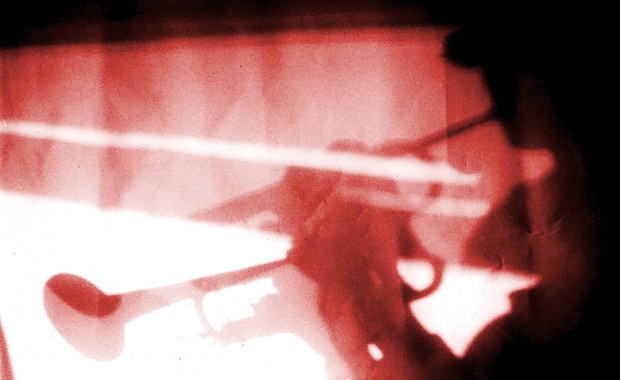

Nicholas Payton
trumpetb.1973

Charlie Parker
saxophone, alto1920 - 1955
In the late fifties, with saxophonist

Ornette Coleman
saxophone, alto1930 - 2015

Cecil Taylor
piano1929 - 2018

John Coltrane
saxophone1926 - 1967

Stan Getz
saxophone, tenor1927 - 1991
With trumpeter

Miles Davis
trumpet1926 - 1991

John McLaughlin
guitarb.1942

Dave Brubeck
piano1920 - 2012
So, again, I ask: Why 1959?
In the seventies, jazz lost most of its popularity and took a nose dive. Smooth jazz came along and it looked like jazz was destined to be a memory. Many jazz artists moved to Europe or scrounged around the USA trying to survive by playing anything from rock, weddings, blues and salsa gigs, and all of them did not pay very well and some players just gave up and got day gigs. Then in the eighties came trumpeter

Wynton Marsalis
trumpetb.1961
It is not the case in Spanish families. Go into any Spanish home and you will hear Salsa coming from the radio. Ask any teenager who

Tito Puente
drums1923 - 2000
Free jazz, now known as improvised music, has incorporated a slew of electronics in its presentation and you can hear distortion pedals used by some players in their straight-ahead playing too. Many new compositions are based solely on electronic sound effects. The only difference between these pieces and classical new music would be the rhythm section. Jazz still uses the basic drum set. I personally love jazz that comes from a historical point of view, whether it's bebop, modern or free jazz. When I say historical, I mean you can hear the music is coming from a harmonic sense with phrasing and rhythmic content, and a touch of blues and a sense of purpose (it tells a story) in the soloing. Haphazard playing, to me, is not music and whatever is being played, whether it's tonal or atonal, has to be honest and musical. I personally love the natural sounds of the instruments. Adding electrical sound effects and noise doesn't add to the music unless it is used in a purposeful way and still sometimes it doesn't make it. I know diehard jazz fans believe that "it don't mean a thing if it ain't got that swing." which is true if you are playing traditional jazz, but free or avant-garde jazz has its own kind of swing, and when you listen or are around it for awhile you can understand what that means.
I am guilty of using sound effects, but I create the effects directly from the guitar without the use of effects pedals and I am very discreet in using them. Each instrument has its own set of natural sound effects and when used with integrity it can make the music interesting and spiritual at the same time. I personally believe in notes. I want to hear music that creates soundscapes with every note and not pedaled sound effects. I believe the effects are great for rock and other types of music, and movie scores, but not jazz.
When John Corigliano wrote the brilliant score to Ken Russell's movie 1980 Altered States, he created new musical notation that in turn created natural sound effects from each instrument in the orchestra. When you listen to this amazing score it sounds electronic but it is not.
For the last six months, besides going to performances and scouring YouTube, I have developed a distinct point of view about jazz then and now. I wanted to see if others agreed with me or am I being too narrow-minded for this day and age. I sent out four questions to some important players. I was surprised that many did not answer, or even respond to say "I don't have time" or "I'm not interested." By not responding, I felt it was a sign of disrespect. The same musicians who are big proponents of jazz popularity, when given a chance to say and express what they mean and feel in the biggest jazz website with hundreds of thousands of followers, doesn't make sense to me. So many times you hear from musicians who send out proposals or email an agent and they never get a response. It is understood that these people are busy and sometimes overwhelmed but it takes less than thirty seconds to write "not interested." There is a rudeness that has perpetuated throughout this art form and the many businesses connected to it.
I would say that guitarists use more electronics than other instrumentalists. But I did send four questions to some very important non-guitarists, too.
I contacted pianist

Hal Galper
piano1938 - 2025
Dom Minasi: The illusive "they" are always talking about moving the music forward. Do you think by adding electronics such as wah-wahs, loops, distortion etc., it is helping do that?
Hal Galper: On this question I have a particular bias, but no, I don't think electronics "move the music ahead." There is a big difference between style and innovation. Electronics fall in to the former category. Miles said, and I paraphrase, "there hasn't been any innovation in jazz since Coltrane, just the development of style." Electronics, world music and all the fashionable hybrids fall into the style category as well.
My bias is that there still is room for innovation in the rhythm of the music. In the last 50 years harmony, melody and form have grown increasing sophisticated but the rhythm has not. I believe a change in the format of background/foreground can offer more creative possibilities, as well as rubato playing, in other words playing on structures in time with the quarter-note flow still informing the music, allowing greater rhythmic variety. But, then again, that is my own personal bias as that's the way my trio plays. Is it innovation or just a stylistic change? To that question I offer this story:

Stan Getz
saxophone, tenor1927 - 1991
DM: Is there a place for electronics in jazz?
HG: Questions one and two are almost the same. To answer this question you'd need to define what jazz is. Good luck with that. That's a minefield that anyone with any sense would avoid and I ain't going there. Jazz is a music that is open to all influences electronic or whatever, the jazz part being in the ear of the beholder.
DM: Some musicians are using odd time signatures ( 7/8, 11/8/ 13/8); is that really what jazz is suppose to be?
HG: My students at both Purchase Conservatory and The New School are showing a marked fascination with odd time signatures, as they should. But there has been little innovation in odd times signatures, played as such, since

Don Ellis
trumpet1934 - 1978

Dizzy Gillespie
trumpet1917 - 1993

Lennie Tristano
piano1919 - 1978
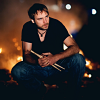
Ari Hoenig
drumsb.1973
DM: Just because it's improvisation, is it jazz?
HG: This is one of my faves. Improvisation does not define jazz. Improvisation is a built-in component of the human physiology. It is a problem solving technique that everyone uses on a daily basis. I mean, how many problems have you solved by merely applying duct tape to it? That we use improvisation in jazz doesn't define the music as jazz.
I found Hal's answers right to the point and If I were asked the same questions my answers would have been basically the same especially numbers one and three.
Trombonist

Steve Swell
tromboneb.1954
DM: The illusive "they" are always talking about moving the music forward. Do you think by adding electronics such as wah-wahs, loops, distortion etc. is helping do that?
Steve Swell: To be honest, the questions posed here, to this musician at least, are irrelevant and have been for quite some time. It seems, with the proliferation of jazz magazines/blogs, educators with little real experience playing the music and whatever else may soon be out there, the "illusive they" have little to do with the music let alone "moving it forward." Rather, it seems that there is a lot of interest in just talking about music, writing about music, being "experts" on the music (and musicians), yet little understanding about this music or we musicians who make it, whatever the genre of jazz or improvisational approach discussed.
It has become a side show and in some instances, cottage industries have sprung up where the "illusive they" make more of a living off of the music than the musicians themselves. So I guess right off I take issue with the "illusive they" ("allusive" I believe is the correct word but "illusive" makes it sound as onerous as it is) because the people doing the "illusive they-ing" and not the playing or composing don't really know much about it. There are many intelligent, sensitive writers and educators out there and I count a number of them as real friends. But the damage and promotional biases of some "illusives" I've witnessed over the years is frankly not very pretty.
DM: Is there a place for electronics in jazz?
SS: The question of electronics is an old one and being rehashed here for a new generation that may not know of its already lengthy history. First, wah-wah pedals are the direct result of plunger mutes. Miles Davis' use of electronics alone should have put this question to rest by now. There are many musicians who have been using electronics and computers in jazz, new music and other approaches to improvisation for quite some time. I don't believe electronics move the music forward necessarily but they do add soundscapes that weren't there before. There are many examples of "jazz musicians" who started in jazz and later incorporated electronics or computers into their work. And these musicians have fostered relationships with improvisers or composers who did not have their start in jazz, but together have found common ground in the making of interesting music by including electronics or computers. So I'm not sure if it's a question of "having a place in jazz" as is it okay for jazz musicians to be involved with this technology, and that question has been answered by the musicians. I'm not interested in using electronics personally but I'm not against playing with musicians who do if it's the right fit. I've performed with Elliot Sharp,

Rob Mazurek
trumpetb.1965
DM: Some musicians are using odd time signatures ( 7/8, 11/8/ 13/8); is that really what jazz is suppose to be?
SS: Two names: Dave Brubeck and Don Ellis. There's lots of talk today about "what jazz is supposed to be." There are "illusives" who believe jazz is supposed to be one thing only because they want to control it; financially, culturally. That is not what jazz ever was. If jazz is supposed to be only one thing, then it probably was only supposed to be what the music of

Louis Armstrong
trumpet and vocals1901 - 1971

Paul Desmond
saxophone, alto1924 - 1977

Bill Dixon
trumpet1925 - 2010
DM: Just because it's improvisation, is it jazz?
SS: To me, "jazz" is a world music that is flexible and always growing. Improvising has been around a lot longer than jazz itself. It was jazz though that brought improvisation back into western culture. Musicians now are exploring all that is available to them as improvisers. Traditional jazz (swing, bebop) being one aspect. And because improvisation is an important part of jazz, people who improvise with no jazz background or approach get lumped together with those that started in jazz and branched out and incorporated other techniques. There is even a case to be made of new generations coming up simultaneously learning traditional jazz improvising and other kinds of improvising. It is just where we are with the information that is available. The main criterion for me in all this is depth of feeling: Soul. Depth of curiosity, making the music interesting. Today we have the choice to stay in strict accordance with one definition of it or whether you want to use all of music's rich languages to create your own identity which is what jazz or a life spent in any music should be about. Then, there are the fans that listen to our music to be surprised by it and have it take them wherever their hearts and minds let them. Fans, and musicians will move the music forward, or backwards or skywards or around the corner or wherever it wants to go, never worrying about what to call it.
Very strong statements from Steve.
Here's another point of view from guitarist extraordinaire,
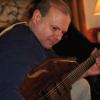
Joe Giglio
guitarDM: The illusive "they" are always talking about moving the music forward. Do you think by adding electronics such as wah-wahs, loops, computers, distortion, etc. is helping do that?
Joe Giglio: Not really, Dom. I believe that people are what truly move the music forward. Any stimulus, be it sunshine, electronic effects, one's musical collaborators, the way an instrument feels on a particular day, etc, can have an effect on how/what one plays. My belief, by which I musically live, is that if one is in the moment, then so is the music—moment after moment, after moment...
DM: Is there a place for electronics in jazz?
JG: Yes. Some of the most beautiful and soulful music I have ever heard is

Stevie Wonder
vocalsb.1950
DM: Some musicians are using odd time signatures ( 7/8, 11/8/ 13/8); is that really what jazz is suppose to be?
JG: If they are feeling those fractions, great—If they are using them because that is the prevailing trend, not so much.
DM: Just because it's improvisation, is it jazz?
JG: No. One might ask, if "Just because it is improvisation, is it flamenco, blues, Bach in his day, Indian classical music, etc?" jazz does stand out in our musical culture because improvisation is a key component. Though one might also ask, "If it is jazz, is it improvised?" Sadly, the answer can often be no.
Short and right to the point the way I like it.
Guitar great

Ed Cherry
guitarb.1954
DM: The illusive "they" are always talking about moving the music forward. Do you think by adding electronics such as wah-wahs, loops, distortion etc. is helping do that?
Ed Cherry: If it's done with taste, restraint and good sound, then I'm all for it.
DM: Is there a place for electronics in jazz?
EC: You mean like, when

Charlie Christian
guitar, electric1916 - 1942

Keith Jarrett
pianob.1945

Eddie Harris
saxophone, tenor1934 - 1996
DM: Some musicians are using odd time signatures (7/8, 11/8/ 13/8); is that really what jazz is suppose to be?
EC: Well, I guess it's cool. I mean I really liked what

Steve Coleman
saxophone, altob.1956
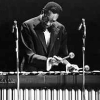
Milt Jackson
vibraphone1923 - 1999
Earl Coleman
b.1925DM: Just because it's improvisation, is it jazz?
DM: Dizzy called it "our music." If we are playing "our music," there's got to be swing, it's got to be soulful, the feeling of the blues and the African American church has to be up in there somewhere, or else to me, it isn't jazz (America's classical music—another name Dizzy used in describing "our music"). Charlie Parker had all those ingredients in his playing whenever you heard him (and if you are a young non-African American student of this music, you have to understand and appreciate the full spectrum of Black Music in this country and be fully aware of the socio-political aspects that went into its formation). There are influences from other countries in the music all over the place now, and that's great, but if the soloist is playing stiff and sounding like a classical musician playing what he thinks "our music" is supposed to sound and feel like, well, I shut down immediately on that. No matter how far out John Coltrane got, you always heard that "moan" or "shiver" in his solos. That's the blues, that's the church you are hearing (I think I heard Wynton say that somewhere).
These are some very strong statements from four great musicians from different backgrounds. Almost all agree in some way or another. I personally believe that there is nothing really new in jazz except the approach to the music as an individual player. And what I mean by that is, each instrumentalist, in order to move forward, has to move forward on his instrument. His/her approach to the way the instrument is played and what that approach can bring to the music in an innovative way and usually that is by phrasing, harmony, rhythm and technique. Some players have so many pedals that it is no longer about the music, it's about the effectss and learning to use those effects is like learning a new instrument. I personally don't have the inclination or the patience to do that. I find there are always new techniques to discover in the use on my instrument without dabbling into effects. Playing with musicians such as

Tomas Ulrich
cellob.1958
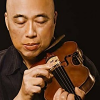
Jason Kao Hwang
composer / conductorb.1957

Ken Filiano
bassb.1952
Did jazz die in 1959? I don't think so. It was on pause for a few years.
What is jazz now? It's whatever we want it to be and that can be a personal issue for each and every one of us.
Tags
Dom Minasi
On and Off the Grid
United States
John Kelman
Nicholas Payton
Birdland
Charlie Parker
Ornette Coleman
Cecil Taylor
John Coltrane
Stan Getz
Miles Davis
john mclaughlin
Dave Brubeck
wynton marsalis
Tito Puente
Hal Galper
Don Ellis
Dizzy Gillespie
Lennie Tristano
ari hoenig
Steve Swell
Elliot Sharp
Rob Mazurek
Louis Armstrong
Paul Desmond
Bill Dixon
Joe Giglio
Stevie Wonder
Ed Cherry
Charlie Christian
Keith Jarrett
Eddie Harris
Steve Coleman
Milt Jackson
Earl Coleman
Tomas Ulrich
Jason Kao Hwang
Ken Filiano
Comments
PREVIOUS / NEXT
Support All About Jazz
 All About Jazz has been a pillar of jazz since 1995, championing it as an art form and, more importantly, supporting the musicians who make it. Our enduring commitment has made "AAJ" one of the most culturally important websites of its kind, read by hundreds of thousands of fans, musicians and industry figures every month.
All About Jazz has been a pillar of jazz since 1995, championing it as an art form and, more importantly, supporting the musicians who make it. Our enduring commitment has made "AAJ" one of the most culturally important websites of its kind, read by hundreds of thousands of fans, musicians and industry figures every month.






 Buy Now
Buy Now





